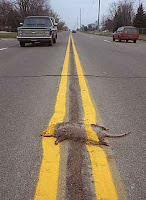This is the first in a four part series examining the use of blogs to open communications between consumers and companies in genealogy. In this part we will introduce the Cluetrain Manifesto. Part two will present relevant points from the Manifesto. In part three we'll examine the official blogs of Ancestry and FamilySearch. In the fourth and final installment, we'll talk about employee bloggers.
The Cluetrain Manifesto
I found the Cluetrain Manifesto nailed to the door of The Church of Employee Bloggers. The list of 95 theses is a 1999 prophecy regarding the "conversation" between markets (consumers) and companies.
The manifesto prophesied that consumers would form such strong online communities that companies would be forced to open honest, candid lines of communication between individual consumers and individual employees. Companies that didn't would perish. The more controversial parts of the manifesto further reasoned that strong intranet organized employees would make hierarchical management unprofitable and obsolete.
While some of the theses have not stood the test of time, others still seem to be true, six years later. Some ring particularly true for employee bloggers.
The name of the manifesto comes from a statement made by "a veteran of a firm now free-falling out of the Fortune 500."
The clue train stopped there four times a day for ten years and they never took delivery.
The Cluetrain Manifesto started as a website. The ringleaders, as they call themselves, explain that "when we created Cluetrain.com in April, 1999, it kicked up some dust. A few thousand people signed their endorsement of the ideas. Lots of email, lots of press coverage." The website led to a book which is now available online.
The manifesto hit a chord for many. The comment of one signer echoes the feelings of many. "I'm blown away. Floored. Bowled over. The manifesto rocks."
The manifesto also garnered its share of criticism. John C. Dvorak, a popular columnist for PC Magazine, said the book's authors "managed to capture in one book almost all of the lunatic fringe dingbat thinking that characterized the Internet boom."
Next week we'll look at some of the theses so you can make your own conclusions.


I am interested in your opinion regarding blogging personal family histories and photos. I thought it would be an effective way to share photos, family histories, and scanned documents with family members, but I am hesistant of posting the information on the internet. Should I be hesistant? If you have time, I would appreciate your input...
ReplyDeleteI have had the same concerns that the previous comment mentions. I keep a family history blog to encourage my family to share stories, but I am very aware of privacy issues on the web. Therefore, I require a password to gain access to my blog. I created a simple username and password and gave it to family members. This prevents Google and other search engines from indexing my site as well. I use Apple's iWeb and MobileMe (formerly .Mac) as my blogging software and web host, because it is easy to protect with a password. I haven't looked into other blogging options. I do provide public access to my family tree, but I start the lineage with my great-grandparents, so there is no public information for current generations. I hope others post comments on this as well
ReplyDeleteOl' Myrt here thinks the line must be drawn between deceased ancestors and living individuals when it comes to rights of privacy and posting things on the internet. Respect the rights to privacy of living individuals. My best guides it to start with your grandparents.
ReplyDeleteIf you wish to provide a family website for communication among living individuals, then the password access is an excellent idea.
Providing digital images of proof documents (those used to determine familial relationships) of each deceased ancestor will go far in the "let's not reinvent the wheel" game. Providing information online WITHOUT documentation will merely force you to spend more time sending said documents to those who will find your postings and wish to know more about your genealogy research.
ThanksMYRTLE.
ReplyDeleteKnowing your technical background, yet approachable style, I'm always interested in seeing where you draw the line on your own blog. I hope to write an entire article about the topic one day.
-- The A.I.